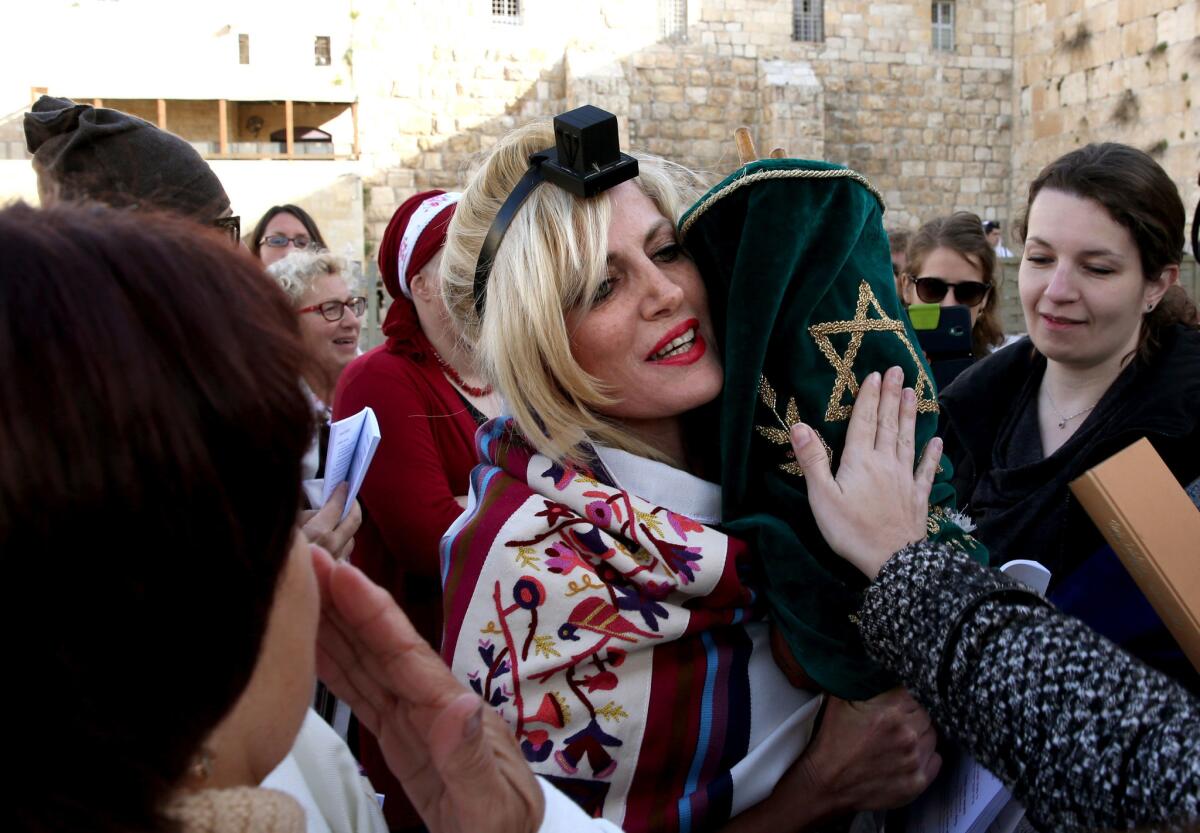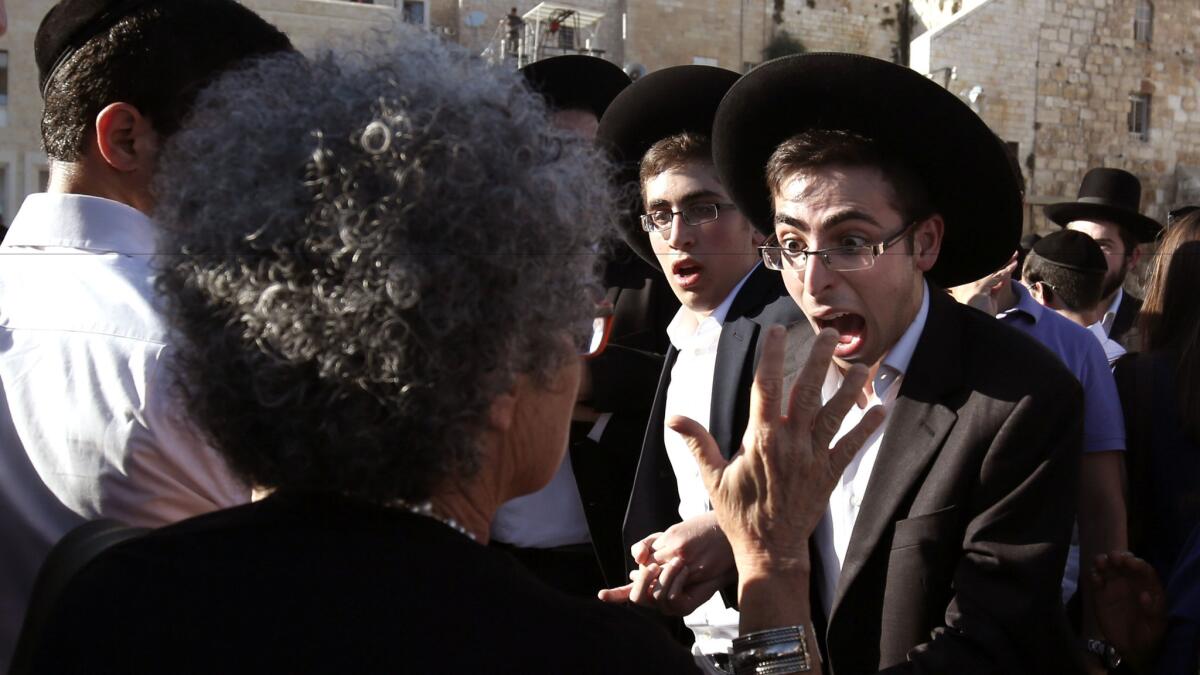Battle over women praying at Jerusalem’s Western Wall continues as compromise stalls

- Share via
Reporting from Jerusalem — Clutching smuggled Torah scrolls, dozens of feminist activists approached the Western Wall, wrapping themselves in colorful prayer shawls and chanting passages from the Jewish Bible.
Their display of piety was met by ultra-religious hecklers who denounced them as heretics and prostitutes. “You can’t change the Torah!” one shouted. “Get out of here!” Another ripped up a prayer book used by the feminist group, Women of the Wall.
For the record:
9:25 a.m. Aug. 13, 2016This article describes the Western Wall in Jerusalem as the last remnant of the ancient Jewish Temple complex. There are other remnants.
Last month’s prayer confrontation was part of a long-running struggle over worship at Judaism’s most important pilgrimage site that pits Israel’s Orthodox religious establishment, which wants to uphold a traditionalist ban on women leading prayer services, against the Women of the Wall and liberal Jewish denominations that want the site opened up to egalitarian and pluralist prayer.
“It’s my right to decide how I pray in my country,’’ said Tammy Gottlieb, 32, a Women of the Wall board member, as she rode in a van full of activists to the holy site in Jerusalem’s Old City.
In recent months, tensions over women’s prayer have been escalating, and a compromise aimed at ending the dispute has stalled. Under the deal approved by Prime Minister Benjamin Netanyahu’s Cabinet in January, Women of the Wall and liberal Jewish denominations would be given a new prayer space at a nearby spot along the Western Wall. However, the government hasn’t started implementing the compromise and ultra-Orthodox parties oppose it.
“It’s like if a Muslim came to the Al Aqsa Mosque and wanted to enter without taking their shoes off. Would they let him?” asked Haim Rabinowitz, an aide to Rabbi Yisrael Eichler, a legislator from the ultra-religious United Torah Judaism party, referring to the Islamic holy site above the Western Wall. “There are rules, and there’s religious law. In Judaism, there’s no such thing as renewal or reform. There are no compromises.”

That is not the position taken by the Reform and Conservative wings of Judaism, which are much stronger in the United States than in Israel. As a result, the turf battle at the Western Wall is undermining the longstanding alliance between Israel’s government and wide swaths of North American Jewry.
The dispute over women’s prayer at Western Wall, known in Hebrew as the Kotel, has roiled relations between Netanyahu — who relies on ultra-Orthodox religious parties to stabilize his coalition — and religiously liberal Diaspora Jews who complain that Israel’s conservative government is impeding religious freedom at Judaism’s most revered prayer site.
“In North America, there’s a whole generation of women who have been ordained as rabbis,” said Steven Wernick, chief executive of the organization representing Conservative congregations, as the women’s singing echoed throughout the plaza. “They come here and there’s no place in the Jewish homeland for us to worship at our holiest site according to the customs that we’ve developed.’’
The Jewish Agency, a nonprofit group promoting Jewish immigration to Israel, which helped broker the Western Wall compromise after three years of negotiations, warned in a statement that failure to provide a space for pluralist prayer at the wall would have “far-reaching implications” for Israel-Diaspora ties.
People are up in arms: They can’t believe that in Israel of all places, a woman is being arrested for holding a Torah.
— Shira Pruce, a spokeswoman for Women of the Wall
Tensions over religion and state in Israel stretch back to the country’s founding, when Israel’s secular founders promised to defer to Orthodox Jewish leaders on public Jewish ritual, marriage and Sabbath observance in order to secure their support for the new state.
The dispute over the Western Wall is one of several tinderboxes for Israel’s Orthodox establishment and the more liberal denominations. The Israeli parliament passed legislation to ban non-Orthodox from performing conversion ceremonies in state-run ritual bathhouses.
The wall, with its giant stone blocks, is the last remnant of the Jewish Temple complex built two millenniums ago and has attracted Jewish pilgrims for centuries. After Israel conquered East Jerusalem in 1967, it cleared out a sprawling plaza that was partitioned off for gender-segregated worship, and the government handed over management of the site to Israel’s ultra-Orthodox religious authorities, who run the plaza as if it were a synagogue.
The female activists, who have been holding services at the wall on a monthly basis since 1988, have pursued several court petitions challenging the ultra-Orthodox control the site.
In their gatherings, women lead prayers, wrap themselves with black phylacteries and chant passages from the Torah scrolls — roles reserved for men under strict readings of Jewish religious law. They are often met by rowdy crowds of ultra-religious students and teams of police who have tried to block or shout down the prayer service.
“Women of the Wall is simply reminding us that the wall doesn’t belong to any one segment of the Jewish people,” said Yossi Klein Halevi, an American Israeli author and a fellow at the Shalom Hartman Institute in Jerusalem. “This is a battle for Zionism: Is the state going to be an expression of Zionism, with its ideology of Jewish peoplehood, or is it going to be run under ultra-Orthodox blackmail, and allow a minority of world Jewry to exclude a majority.”
In June, the executive director of Women of the Wall, Lesley Sachs, was detained by police for hours for bringing a Torah scroll into the Western Wall plaza.
“That was an escalation,” said Shira Pruce, a spokeswoman for the organization. “People are up in arms: They can’t believe that in Israel of all places, a woman is being arrested for holding a Torah. If the interim plan is arresting women at the Kotel, this issue is going to get much hotter.”
One day last month, Women of the Wall activists were checked by security guards to see if they were trying to sneak banned ritual objects into the women’s section of the plaza. Wearing stickers reading “equal” and “love thy neighbor as thyself,’’ the women held a bat mitzvah ceremony for 13-year-old Milwaukee native Frannie Turner using a smuggled Torah scroll and a ritual canopy.
The service passed relatively quietly, with no direct confrontations between the women and ultra-Orthodox demonstrators, and no one detained by police.
“The chance to join Women of the Wall and protest against archaic thinking is an honor,” wrote Claire Turner, Frannie’s mother, in an email after the ceremony. “It was joyous, supportive, and also very spiritual.”
But Shulamit Tsolani, a 59-year-old nursery school teacher from Jerusalem, surveyed the prayer service in disgust.
“When we used to come here, we felt the holiness of the place. They are ruining it,” she said. “A woman is not allowed to carry a Torah scroll. They don’t believe what we believe in.”
Mitnick is a special correspondent.
MORE WORLD NEWS
A Syrian city has gone without running water for five days, U.N. says
China’s crackdown on dissent is described as the harshest in decades
Spirits are low at Russia’s Olympics party house, with fans grumbling that doping bans are unfair
More to Read
Sign up for Essential California
The most important California stories and recommendations in your inbox every morning.
You may occasionally receive promotional content from the Los Angeles Times.










